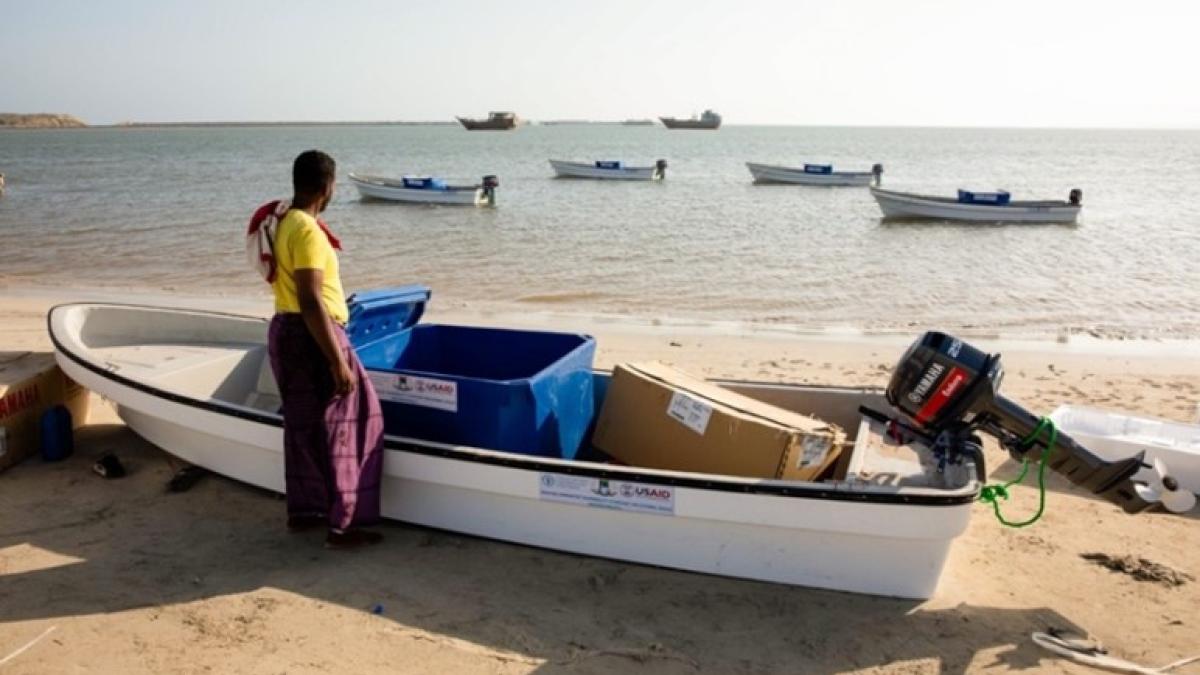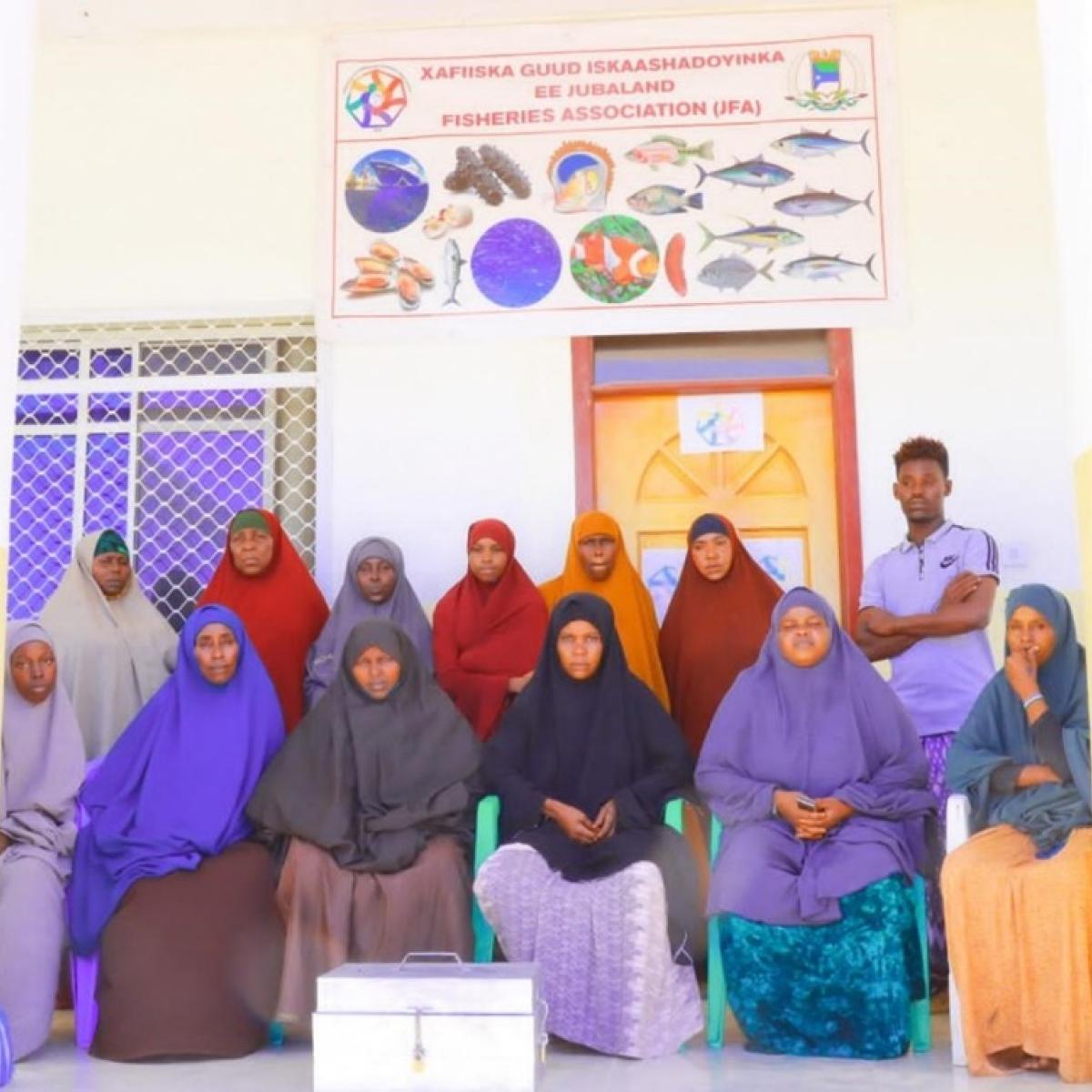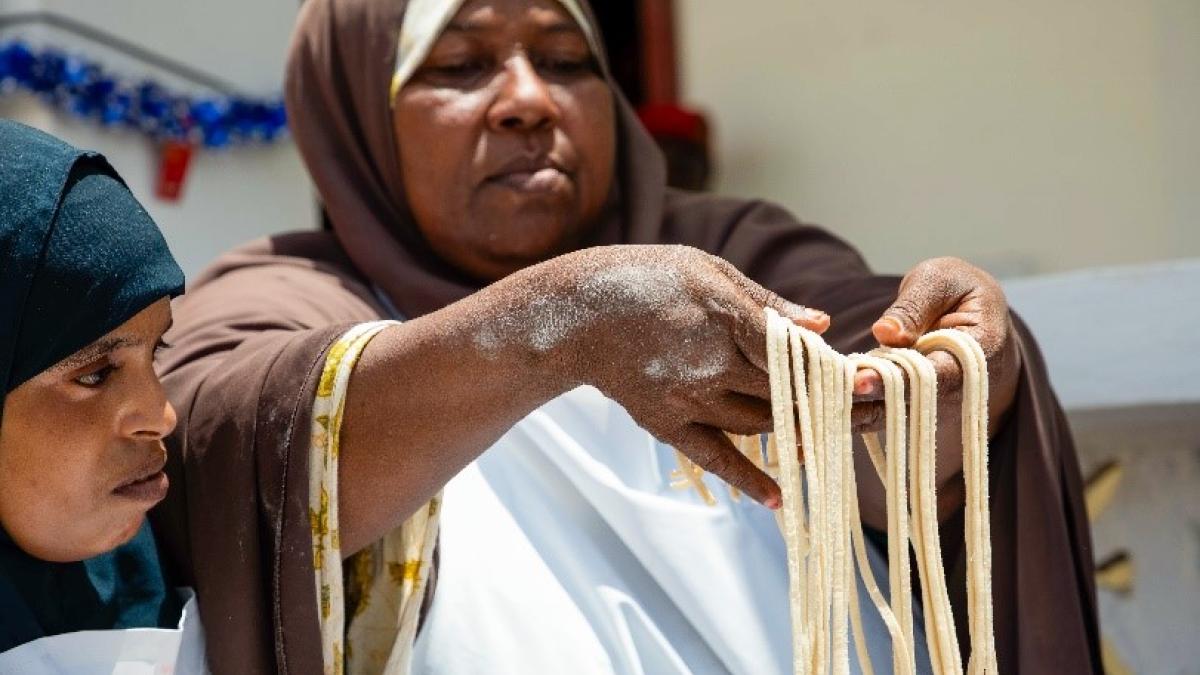The climate crisis in Somalia continues to impact impoverished communities already vulnerable to recurrent droughts and floods often resulting in crop destruction, loss of livestock and chronic and acute food insecurity. Climate crises threaten Somalia’s socio-economic progress by increasing water and food scarcity, the need for humanitarian assistance, displacement, and the degradation of traditional livelihoods. At the same time, Somalia harbours a wealth of untapped potential, including a 3 300-kilometre coastline - the largest in Africa. Though the fisheries sector is still in its nascent stages, support to this sector could dramatically expand socio economic opportunities in Somalia and help sustainably address food insecurity as well as contributing to economic growth.
With funding from the United States Agency for International Development (USAID), the Food and Agriculture Organization (FAO) has been working with the Jubaland Ministry of Fisheries and Blue Economy to increase fish production and strengthen fisheries cooperatives. The USAID-funded project entitled ‘Reducing Communities’ Vulnerability to Drought and External Shocks (RECOVER)’ has equipped fisherfolk with fibreglass motorized boats and gear to access deeper fishing waters for bigger fishing hauls. The project also supports 10 fishing cooperatives which provide a forum for training and additional social networks for people in the fishing sector.

One of the key safety nets in rural and urban Somalia are the popular “Ayuutos,” or Village Savings and Loaning Associations (VSLAs). VSLAs help buffer families from the harsh impacts of climatic hazards and disasters by increasing their ability to access finance and communal investment. While these are not new establishments, research by FAO shows that these community-based, informal money saving and lending platforms are key to driving small business growth. Through this research, FAO found that fishing cooperatives could apply the VSLA principals and model to push cooperatives towards sustainability.
As development practitioners, we can’t help but wonder: why such old establishments haven’t been able to grow from the village level to bigger, market driven establishments? To understand the context and limitations in Somalia, let’s take a deep dive into FAO and USAID’s involvement with 10 fishing cooperatives in Kismayo, Jubaland State.
The fishing cooperatives were formed to provide fisherfolk with a platform to share knowledge, access and negotiate optimal prices for their fish products and produce, and establish formal engagement with authorities and other private entities.

With funding from USAID, and in partnership with the government, FAO trained the fishing cooperatives on business and financial literacy and how to access and utilize the VSLAs model. The cooperatives were equipped with sustainable fishing and safety gear, including boats that serve as a livelihood lifeline for the fisherfolk to safely access deeper fishing waters for their daily catch.
The project is also supporting fish sellers, particularly women to market fish products, access local markets, and promote nutrition education on the importance of protein-rich foods like fish.
Most importantly, USAID and FAO are challenging norms and myths on household production and productivity that perpetuate limitations that extend beyond access constraints to inputs, extension services, markets, land, and capital. These constraints are deeply rooted in socio-cultural norms that impede enthusiasm for uptake of new and alternative livelihood models. Moreover, there is little recognition of the important role that women play along the productive value chains. Often, this restricts the amount of investment and income women derive from a value chain, further deepening existing gender disparities across the sector.
Through this partnership, USAID and FAO encourages a participatory monitoring and learning approach that engages beneficiaries to identify good practices that can be replicated across the sector. This close monitoring is an attempt to understand resilience capacities and drivers, and to identify practical ways of ensuring ownership, uptake and scale up of successful initiatives by the very same households. There has been remarkable progress in promoting locally driven initiatives that challenge entrenched socio-cultural norms and encourage collaboration among community groups.
By empowering groups to leverage existing resources and capacities, there has been an increase in collective efforts towards enhanced productivity and sustainable livelihoods. This intensification of resources strengthens the socio-economic fabric that enables communities to collectively pull out of extreme poverty. For example, during the heavy rains and floods experienced in Jubaland State in November and December 2023, FAO-supported fishing cooperatives were on the front line of the response, barely six months after their formation. As first responders, the cooperatives spent approximately USD 1 000 to purchase relief items-food and non-food items such as rice, clothes, dignity kits, and to distribute cash and clean water. Close to 300 flood-affected households in northern Kismayo were supported under the leadership of these groups.
In readiness for Gu 2024, the fishing cooperatives have begun to replenish their savings and social funds and are regularly sharing flood preparedness messages to their communities in anticipation of any emergency situations from the above-average rainfall forecasted for the season (SWALIM, March 2024).


By February 2024, all ten VSLA groups had more than USD 22 000 in savings. Members are exploring market-based opportunities, including loans from the private sector to enhance their capacity for livelihood diversification. This will enable them to support more community members, pursue innovative business ventures, and play a vital role in seizing opportunities across the fish value chain. For these groups, access to formal finance remains a top priority and a critical enabler of increased production and income. Additionally, they emphasize the importance of market-based infrastructural developments, which are essential for generating profits and ensuring sustainability of their businesses.
To enhance the progress made by these fishing cooperatives, it is imperative to expand technical and financial investment to the groups to enable growth for micro, small, medium, and macro enterprises. This requires robust public and private sector strengthening. Fishing cooperatives need guaranteed access to the fish market, both local and international markets. In addition, the government needs to create a conducive business environment for the fishing cooperatives and the private sector to work in a regulated environment for sustainability. The partnership with FAO, USAID and the government is contributing to efforts towards realizing vibrant businesses across all sectors in Somalia, where all market actors embrace opportunities to engage within the market for increased demand, supply, incomes, profits, expansion of old markets and ventures into new markets.
